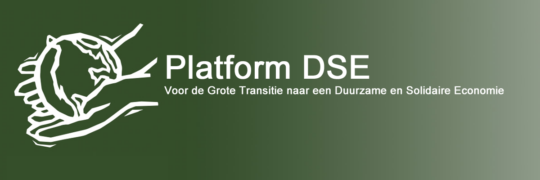The Declaration of Tilburg – which calls for a transformation of our economy towards more sustainability and solidarity – is more urgent than ever before and is received with increasing support. The Tilburg Declaration was followed by a number of expert meetings and a one-day conference in Antwerp in January 2009, from which a range of valuable suggestions emerged. They resulted in an appeal to policymakers and society, with a focus on the economic crisis we now find ourselves in.
Crisis
Each economic crisis is characterised by a fall in consumption and the current one is no exception: the level of consumption as well as investment is decreasing. It therefore comes as no surprise that a strong pressure arose to swiftly restore the previously existing consumption patterns by way of massive financial support for industry. However, this course is disastrous.
Firstly, it demonstrates a lack of willingness to admit that history has taught us some serious lessons. Rather than there merely being a financial-economic crisis, crises have emerged in the areas of energy, food and climate, and we are also witnessing an increase in poverty and an explosion of political tensions and threat of war.
The momentum of a financial-economic crisis also opens an opportunity to take fundamental decisions. During and after the great crisis of the 1930s, states looked for a solution to the fall in consumption. Under Roosevelt’s presidency in the United States, this resulted in the New Deal – financial assistance for small enterprises and a restoration of consumption for the public at large, whilst in Germany, the fall in consumption was countered by building roads and a large-scale militarisation. In Great Britain, it led – particularly after World War II – to the development of a social welfare state (Keynes/Beveridge). These were all decisions with far-reaching effects. Also now, a fundamental reorientation is necessary and possible, rather than unquestioningly following the road of more material consumption, which damages the natural environment and promotes inequality.
This is our first appeal: we call for a new and broad consultation that will consider the various interrelated crisis situations we are currently facing. A consultation in which social partners, the environmental movement, development agencies, women, youth, migrants and scientists participate.
Secondly, we find ourselves in a global context which has changed considerably and also obliges us to make new choices. Often the demands of global justice and the natural environment are played off against one another. However, right now there is a convergence of these concerns. Global investment initiatives have to prioritise strengthening the incomes of the poor. This may be done, amongst others, by debt cancellation, by abandoning one-sided emphasis on export-led development and by creating global institutions that will guarantee local medium-term self-reliance worldwide. This kind of social initiative can also contribute to the urgently needed redistribution of wealth worldwide.
Furthermore, these measures would also contribute to a conscious and targeted change in the course of investment patterns in the so-called rich countries. These should move towards consuming less resources and energy in favour of investments directed at the maintenance and growth of thesocial, human and ecological capital in society.
This is our second appeal: without further delay a start must be made to develop and test existing and new policy measures.These should support the necessary change of direction towards a more social and sustainable economy with regard to particularly the fiscal and monetary system as well as public investments.
All these measures should be shaped into an overall strategy to respond in the medium- and long-term to the financial-economic, ecological and social crisis situations of today (See the declaration of Tilburg).
Finally, there remains one important issue that has been somewhat neglected in the discussions so far, namely, the reform of the existing economic order. This reform should be directed at a fundamental reorganisation of the (inter)national monetary system, which has given too much freedom to private banks to create credit and has enabled speculative financial activities which are the major causes for the present crisis. Stringent forms of regulation of the banking sector, including creating a maximum for annual increase in providing credit in relation to the development of the real economy will be needed. At the same time, legally enforced criteria for financial products to be socially and ecologically sustainable must be adopted. It is equally important to change the course of technological development. We need to move away from applying promising technology systematically and almost exclusively to increasing productivity, because if this current practice persists, even a small fall in private investment will bring about serious unemployment. Technology should be liberated from this one-sided servitude and be used to primarily generate development in a more sustainable and ecological manner.
This is our third appeal: to adopt a policy at the national, European and global level that combines absolute restraint with respect to the consumption of resources and energy and courageous plans to apply technology with the aim of creating a more sustainable and social economy worldwide. This would also contribute to the necessary revision of the Lisbon Treaty as well as a successful outcome of the UN Climate Conference in Copenhagen later this year.
Tilburg / Brussel, February 26, 2009
On behalf of the “Platform Duurzame en Solidaire Economie”
Prof. dr. Bob Goudzwaard
emeritus hoogleraar Vrije Universiteit Amsterdam
Drs. Leida Rijnhout
Coördinator Vlaams Overleg Duurzaam Ontwikkeling
Dr. Lou Keune
Onderzoeker Universiteit van Tilburg
Support
You’ll find the organisations/private persons that signed the Appeal here
A brief selection of comments and reactions to the Appeal you’ll find here.

